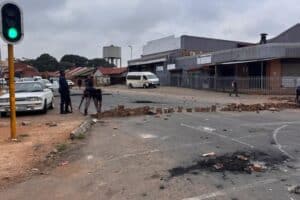It took almost a week for the former defence minister Nosiviwe Mapisa-Nqakula to deploy the army to support the police quell the unrest because she was adamant that there was no insurrection.

A lot of things were said after the deployment of the army and poor handling of the recent unrest in KwaZulu-Natal and Gauteng by the security cluster ministers but now the same people are surprised by the consolidation of security power in the Presidency.
It took almost a week for the former defence minister Nosiviwe Mapisa-Nqakula to deploy the army to support the police quell the unrest because she was adamant that there was no insurrection.
Her decision and the failure of the state security to gather the crucial intelligence that could have prevented the outbreak of the coordinated violence, looting and destruction of property annoyed many South Africans.
Most importantly, it exposed President Cyril Ramaphosa to a wave of criticism. Many could not wait for Mapisa-Nqakula to be booted out but few could have imagined the minister was to be promoted to be the new speaker.
They were unaware that Ramaphosa was literally robbing Peter to pay Paul, so to speak. Of importance to him at the time was not the weakening of the legislature by robbing it of its strong head, but to reinforce his weak corner in the executive.
He had a crisis at hand and disbanding the State Security Agency (SSA) and establishing a new intelligence body could have taken longer.
Entrusted a new minister with the portfolio was unfathomable after failures under then minister Ayanda Dlodlo. It is not the time now to discuss the merits or demerits of Mapisa-Nqakula’s promotion to a post equivalent to that of the deputy president, or why Dlodlo was spared.
But it’s worthy to debate the fact that the blunders of the security cluster could turn a tame president into an overnight securocrat.
Ramaphosa’s decision to move SSA under his direct control did not come as a surprise.
The general frustration over security failures birthed muted criticism from the opposition, which put a stamp of approval to the idea in a meeting with the president.
The Democratic Alliance further felt the president should have sent the soldiers earlier than he did. But the Economic Freedom Fighters (EFF) was the only party with a contrary view, seeing this as the militarisation of the state.
Some say anything, or person, that EFF leader Julius Malema opposes or criticises these days shows that that person is most likely to be doing the right thing. It’s always safe to take anything Malema says with a pinch of salt for he uses criticism to hide his real intention for opposing, which may have to do with his characteristic flip-flopping.
But it is true that the insurrection could turn Ramaphosa into a securocrat, considering that he now controls the SSA and filled the defence portfolio with a tougher individual in former speaker Thandi Modise.
Already, the minister is talking about establishing a paramilitary intermediary unit of the South African National Defence Force to deal with riots of an insurrectionist nature like the recent unrest.
Modise takes no nonsense she put Malema under control soon after taking over the reins from her predecessor, Baleka Mbete, in parliament.
Under her leadership, a method was being devised to enable an impeachment of Section 9 Institutions’ leadership, including the public protector. It can’t be that the military riot squad idea only belonged to her but the president’s paw marks are all over the concept, which Modise said also existed in countries like France.
She spoke despicably of the insurrection as he introduced the idea to parliamentarians on Tuesday. A SSA under the Presidency, a stronger defence minister, a military riot unit mooted, now wait for the beefing up of the public order policing unit with new recruits.
Ramaphosa is beginning to take the security cluster very seriously thanks to the insurrection.
As for the militarisation of South Africa or turning it into a police state, it’s clearly too early to say. But one thing is sure, South Africa has a security crisis that needs to be tackled and a closer control of the security cluster and reinforcement of policing are the only options.
- Eric Naki is political editor
Support Local Journalism
Add The Citizen as a Preferred Source on Google and follow us on Google News to see more of our trusted reporting in Google News and Top Stories.






